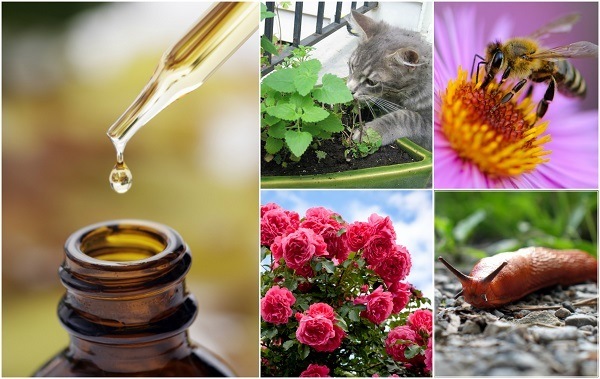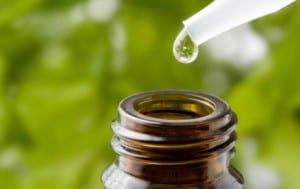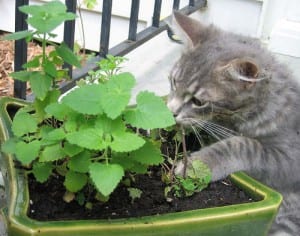
Love gardening? Then you’ll love our brand new Kindle book: 605 Secrets For A Beautiful, Bountiful Organic Garden: Insider Secrets From A Gardening Superstar.
Whether your intent is to repel pests, invite pollinators, or to turn your garden into a relaxing get-away, essential oils can help! Check out these 9 clever ways to use essential oils in the garden.
1. Repel Insect Pests
There are a wide variety of essential oils which – with consistent use – can be used to repel unwanted insect pests from your garden.
Rosemary oil is a potent repellent for many types of pesky insects including flies, fleas and mosquitoes. Rosemary is also great for deterring insect larvae like the cabbage looper caterpillar whose voracious appetite for juicy vegetable foliage can easily destroy entire crops of Brassicas, tomatoes, cucumbers, melons, and even some root veggies if left undisturbed. Peppermint oil is an excellent natural insecticide which works on aphids, squash bugs, white flies, ants, beetles, and fleas, just to name a few. Peppermint is also the best essential oil for repelling spiders. Thyme oil works against biting insects like chiggers, ticks, and roaches. Clove oil is another great deterrent for many flying insects.
To create a broad-spectrum all-natural insect repellent, mix equal parts of rosemary, peppermint, thyme, and clove oils (about 10 drops of each) in a spray bottle filled with water. Remember to shake well before each use. Apply anywhere you want to get rid of skittering, creeping, crawling, or flying pests.
For particularly bad infestations, try using Neem oil. This natural insecticide dissolves the waxy coating of many hard-to-kill garden parasites, dehydrating, and eventually killing them. Neem oil not only works on adult insects. It also kills larvae and eggs, making Neem oil a super-effective all-natural method for reducing populations of insect pests.
2. Suppress Fungus
The cause of around 85% of all plant diseases, garden fungus can quickly become a big problem if left untreated. Parasitic fungi cause damage by poisoning or killing cells, blocking stomata (breathing pores), and stealing nutrients from the plant. If you’re seeing signs of disease in your garden, chances are pretty good that there is a fungus to blame. Try some of these essential oils to stop fungal pests from spreading:
 Tea Tree oil is one of the few natural remedies with the power to not just prevent fungal growth, but also to kill many species of fungus. To treat existing fungal growth or as a preventative, mix about one tablespoon of tea tree oil per cup of water in a spray bottle. Apply directly to infected plants once or twice per week. Remember to avoid spraying leaves when the weather is very hot and dry as sun-heated tea tree oil can easily burn leaves.
Tea Tree oil is one of the few natural remedies with the power to not just prevent fungal growth, but also to kill many species of fungus. To treat existing fungal growth or as a preventative, mix about one tablespoon of tea tree oil per cup of water in a spray bottle. Apply directly to infected plants once or twice per week. Remember to avoid spraying leaves when the weather is very hot and dry as sun-heated tea tree oil can easily burn leaves.
For more information regarding the use of tea tree oil to control garden fungus, read Tea Tree Oil Fungicide for Plants on SFGate.
Previously mentioned Neem Oil is as effective against fungal infections on plants as it is for treating insect infestations.
Two organic compounds in Citronella oil – citronellal and linalool – have been proven to inhibit the growth of many species of fungus. Other essential oils with powerful fungicidal properties include Rosemary, Oregano, Thyme, Peppermint, Clove, and Cinnamon oils. Also effective against garden fungus are oils extracted from plants in the Allium family (Onion, Garlic, etc.)
To create an anti-fungal garden spray using any of these ingredients, add 8 – 10 drops of essential oil into a large glass spray bottle filled with water. Remember to shake before each use.
3. Stop Slugs and Snails
Cedarwood, Hyssop, and Pine are the best essential oils for keeping gastropods off of your plants. Mix about a teaspoon of your chosen oil(s) in a spray bottle filled with water. Apply diluted oil in a ring around plants where slugs and snails like to visit. Refresh as needed.
4. Discourage Vermin
Mice and other rodents are repulsed by the clean, fresh scent of peppermint. Douse cotton balls with 1 – 2 drops of Peppermint oil a piece then tuck them into the entrances of mouse holes, squirrel nests, and other rodent burrows to persuade rodent residents to relocate. Replace as needed.
5. Dissuade Pets
 Did you know that cats hate the smell of Rosemary? If you can’t seem to keep the neighborhood tomcat from leaving his delightful presents amidst your herbs and veggies, try spraying your mulch with Rosemary oil diluted in water. Alternately, you can add a few drops of Rosemary oil to a wide, shallow container partially filled with water. Whisk vigorously to break up oil droplets then drop in strips of cloth or pieces of string. Allow them to soak long enough to absorb all of the oil. Tie strings between plants or around the garden perimeter. Hang cloth strips between garden rows, around plants, or anywhere you know the cat likes to dig. Refresh as needed.
Did you know that cats hate the smell of Rosemary? If you can’t seem to keep the neighborhood tomcat from leaving his delightful presents amidst your herbs and veggies, try spraying your mulch with Rosemary oil diluted in water. Alternately, you can add a few drops of Rosemary oil to a wide, shallow container partially filled with water. Whisk vigorously to break up oil droplets then drop in strips of cloth or pieces of string. Allow them to soak long enough to absorb all of the oil. Tie strings between plants or around the garden perimeter. Hang cloth strips between garden rows, around plants, or anywhere you know the cat likes to dig. Refresh as needed.
Black Pepper (or any other pepper, for that matter) essential oil can also be used to deter larger mammals from your garden. Dogs, in particular, with their sensitive noses will be turned away from the strong odor of pepper oil. Apply using the same string / cloth method as with Rosemary oil (above). Just keep in mind that over-use of this essential oil may make your garden less pleasant for humans as well.
6. Treat Bites & Stings
Bites and stings from bees, wasps, ants, and other insects are always a possibility, even for the most careful gardener. Mix 2 drops of Lavender oil, 2 drops of Chamomile, and 1 drop of Basil essential oil with one teaspoon of Organic Apple Cider Vinegar. Apply this remedy to fresh bites and stings with a cotton ball or pad.
Alternately, you can mix the same oils, but substitute Jojoba oil for the ACV. Cleanse bites and stings with a cotton ball soaked in ACV, dab dry, then applying the soothing oil blend.
7. Attract Pollinators
Essential oils aren’t just for repelling unwanted creatures from your garden. You can also use certain fragrant oils to attract natural pollinators to your garden. The scent of Neroli (orange blossom) is an irresistible attractant for bees, as are the essential oils of many small-blossomed flowers such as Lavender, Hyssop, Marjoram, Helichrysum, Basil, Sage, and Rosemary. Also, try Lavender, Yarrow, Catmint, Fennel, Helichrysum, and Sage essential oils to attract more butterflies to your garden.
8. Enhance the Mood
Perhaps you have a private little nook – a sanctuary filled with growing things where you go to relax after a long and stressful day. Why not add an essential oil burner and fill it with aromatherapy oils to enhance the calming effects of your secret garden? Check out these tips for mixing essential oils.
For the best selection of therapeutic-grade aromatherapy essential oils on the internet, we recommend Mountain Rose Herbs!
9. Make Your Own Mosquito Repellent
Probably the most well-known essential oil for repelling mosquitoes and other biting insects is Citronella. However, if you aren’t a big fan of the scent of this pungent herb, there are plenty of alternatives which can be used to keep these annoying blood-suckers away from your skin. Either way, just follow these simple instructions to create your own natural mosquito repellent.
Before you begin, you’ll need a small glass spray bottle filled with about 2 ounces of water and 1 ounce of organic witch hazel. You can also add about 10 drops of jojoba oil which is a natural insect repellent and great skin conditioner. Once you’ve done this, it’s time to pick out your essential oils.
Recommended Reading: 11 Plants That Mosquitoes Hate
The “Heavy Hitters” – (Choose one or two.)
Because these oils are very strong, they should be used in smaller amounts than the other ingredients in your mosquito repellent. Choose one or two from the following six essential oils and add 2 – 4 drops total to the mixture.
Citronella, Lemongrass, Cajeput, Eucalyptus – all great natural insect repellents
Peppermint – also works against ants, flies, lice, and spiders.
Garlic oil – personally tested and confirmed to be very effective. (Even tiny six-legged vampires hate garlic!)
The “Distance Runners” – (Choose at least one.)
These essential oils have lower levels of volatile organic compounds so they tend to have richer, longer-lasting aromas than the ingredients from the first category. Keep in mind that this will be the main ingredient – and thus the main scent – in your natural mosquito repellent. Choose your favorite (or favorites, if you want to use more than one) from the following five oils and add 10 – 15 total drops to the mix.
Clove, Lavender, Tea Tree – all effective natural insect repellents
Pine oil – also works well against fleas and ticks.
Rosemary – keeps flies away in addition to mosquitoes.
The “Harmonizers” – (Choose one, maybe two.)
These oils help to balance out your blend and stabilize the more volatile, strong-smelling ingredients. Choose one (maybe two) essential oils from the following three oils and add 3 – 6 drops total to top off your homemade mosquito repellent.
Cedarwood – natural insecticide with a fresh piney fragrance.
Sandalwood – somewhat weak protection against mosquitoes, but has an incredible warm and woody aroma.
Patchouli – deters bed bugs, ants, fleas, and lice in addition to mosquitoes. Very strong, smoky and musky scent.
Always remember to shake well before spraying your all-natural homemade mosquito repellent!
Essential oils have a huge number of uses for health, beauty and around the home, and with the advice of this article, you now know how you can use essential oils in the garden.
Need any of the essential oils mentioned in this article? The best place to buy them is from this page on Mountain Rose Herbs.
